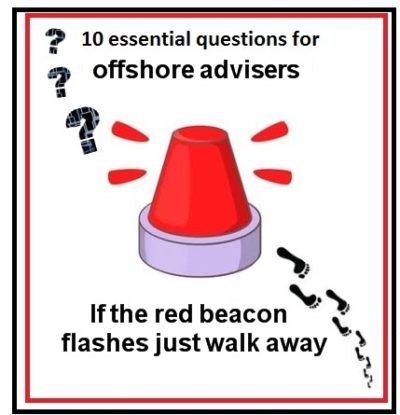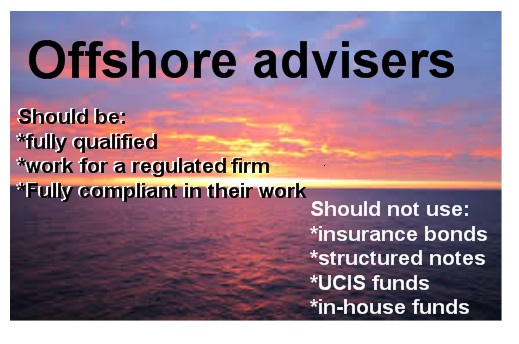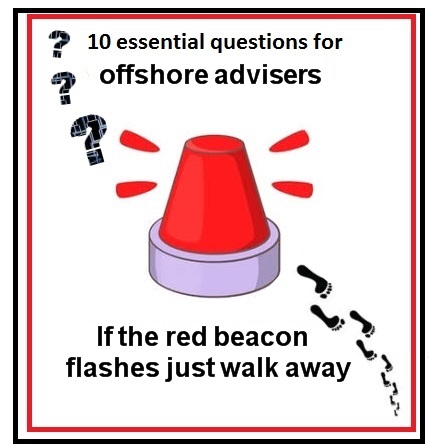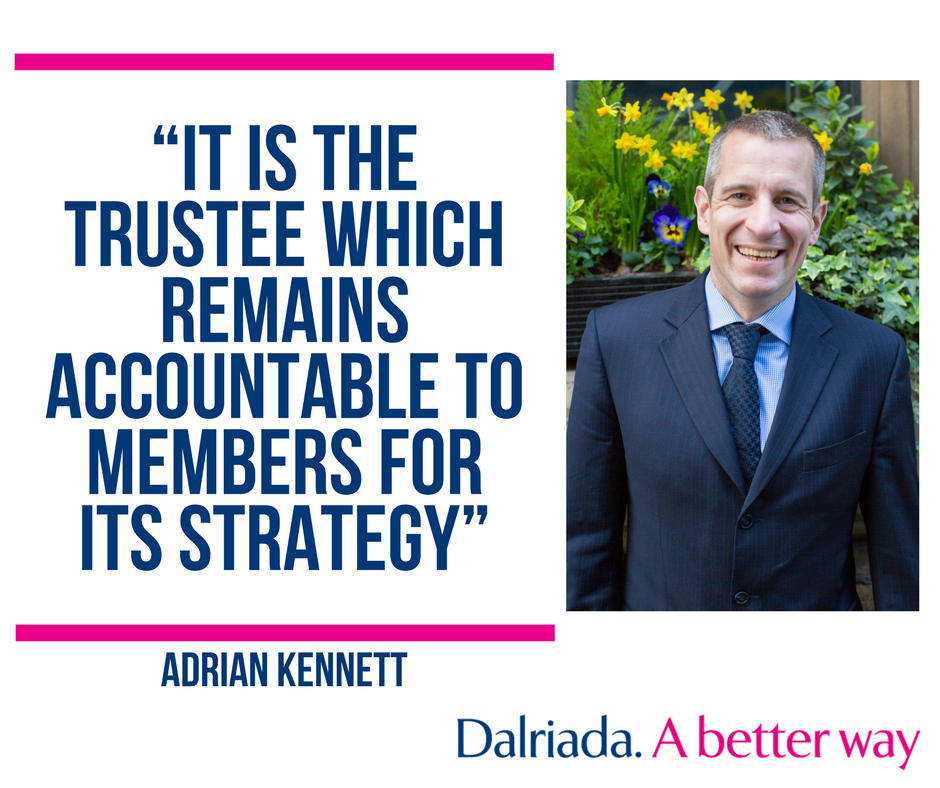 Pension Life is working towards making offshore financial advisers more transparent. We have created a list of 10 essential questions for offshore advisers and their preferred answers. For too long precious pension funds been left in the hands of unqualified, unregistered advisers and unregulated financial advisory firms.
Pension Life is working towards making offshore financial advisers more transparent. We have created a list of 10 essential questions for offshore advisers and their preferred answers. For too long precious pension funds been left in the hands of unqualified, unregistered advisers and unregulated financial advisory firms.
Offshore advisers need to follow a strict set of rules just as UK-based ones do. Being offshore doesn’t mean you can invent your own set of rules for financial advice. However, it seems more and more people are being poorly and illegally advised in the transfer of their pension funds.
Offshore advisers often use unnecessary insurance bonds to skim extra commissions without disclosing these commissions prior to the pension transfer. It is clear more information needs to be available to the clients of these ill-advised pension transfers. With greater transparency, pension holders would be able to make better informed decisions about advisers to whom they entrust their transfers. Also, they will have better knowledge of how to spot a pension scammer.
With so many advisory firms out there, it is hard to know when your inner beacon should be flashing a bright red warning light telling you to just walk away. Pension Life has put together this list of 10 essential questions to ask your offshore adviser.
If their answer points to the red warning light walk away – FAST!
- What are your qualifications – are you qualified to give advice on pension transfers? and what CPD have you done recently? Advisers giving advice on pensions must be qualified to a certain level. Click on the link above to read what these requirements are. Simply having a qualification isn´t enough. Advisers must be qualified to the correct level and they must have made an effort to complete the relevant continued professional development (CPD). In addition they must pay their membership fees to the institute with which they qualified.
- Is the company you work for regulated for insurance and investments? If the answer to this question is NO – walk away – DO NOT take any financial advice from them. All companies who give financial advice on pension MUST be licenced to do this by being regulated for both. An insurance licence is not sufficient.
- Compliance. Is there a robust compliance department staffed by qualified personnel? If the answer is no walk away.
- Do you use insurance bonds? If the answer to this is YES – walk away. If your pension goes into a SIPPS or a QROPS, it does not need two wrappers and therefore an insurance bond is just another way of the adviser making more money out of your fund though commissions – hence draining the value of your pension fund.
- Do you use structured notes, UCIS funds or in-house funds? If the answer to this is YES – walk away. Structured notes are for ´professional investors only´; they are high-risk and not suitable for a pension which is classed as a retail investment that should be placed into a low-medium risk investment.

- Do you use a reputable firm for DB transfers? If the answer is NO walk away.
- Do you carry out a detailed fact-find to establish a client´s risk profile? If the answer is NO walk away.
- Do you disclose all the fees and commissions at the start? Often we hear of pension scam victims who have been told by their adviser that their pension review is free and no other fees or commissions are mentioned during the transfer process. Once that transfer has completed the clients look at the pension fund value and find that a large chunk has been taken to cover various ´costs´. Every pension fund transfer will have some reasonable charges. However, many scammers apply extra charges and fees that are far above what is reasonable and proportionate. These are often undisclosed. Make sure that your adviser is able to provide – in writing – all of the costs. Once you have these details, you will be able to make an informed decision as to whether you are happy for the transfer to proceed.
- Do your clients get regular updates on the progress of their funds and have full access to check this for themselves? You should be able to check the progress of your pension whenever you want. However, a good adviser should provide you with a quarterly update. This should include any charges or fees incurred and any profit/loss made. A yearly review should also be carried out to ensure your pension fund is steadily growing with the right investments.
- How do you deal with customer complaints?
 If your offshore adviser refuses to answer the questions or skims around an answer – just walk away. Anyone offering pension advice should adhere to certain criteria and he must be ready and willing to provide you with all the information you ask for. He should be fully transparent about all the details involved with your pension transfer.
If your offshore adviser refuses to answer the questions or skims around an answer – just walk away. Anyone offering pension advice should adhere to certain criteria and he must be ready and willing to provide you with all the information you ask for. He should be fully transparent about all the details involved with your pension transfer.
Once you have ensured that your adviser is fully qualified and regulated, and operates in a manner that is within your pension fund´s best interests, we would advise you to check out our other blog:
10 essential questions to ask an IFA
This blog covers pension options in a bit more detail.




Have you looked at ‘Chorus Financial’ working out of Javea Angie? http://chorusfinancial.es/ What exactly is a ‘trading style’? On their website: ‘Chorus Financial is a trading style of Tourbillon Limited, authorised and regulated by the Financial Services Commission (Gibraltar)
Licence Number FSC1118B.Registered with the UK FCA, reference 539348.’
And: ‘The option to have your investments managed by an FCA regulated Chartered Financial Planner; the height of industry experience and expertise.’
The two staff: ‘Sam is a current member of the Chartered Insurance Institute and keeps up to date with both Spanish and UK financial regulation through regular exams and ongoing professional development in accordance with regulatory requirements.’ and ‘Tracy is a current member of the Chartered Insurance Institute and keeps up to date with both Spanish and UK financial regulation through regular exams and ongoing professional development in accordance with regulatory requirements.’
No exact qualifications mentioned…..
Not able to comment on the firm or their competency, but have checked the CII register. If there is no title after the name, they are ordinary members, this means they are unqualified members and this level of membership is open to students or any member of the public for a small fee. I do wish the CII would make this clear as it is a well-known ruse by the non-UK advisers to give the impression of professionalism. Some CEOs of some of the larger firms join on this basis which should be cause for alarm if that is how they lead from the back!
If a Chartered Financial Planner is involved, then who is he/she? Shouldn’t the investors be talking to the CFP rather than the “possibly” unqualified team?
Hi, I thought getting a response direct from the company might be helpful Javi, and I regularly follow Angie’s blogs. We are a partnership based on the Costa Blanca of 2 advisors who were unable to find a company we could work for to give truly independent advice here in Spain, so created our own. My personal background is 16 years as a trader and portfolio manager, and in terms of exams I have R01, R02, R04, R05. I do not have the UK tax exam R03 which would’ve allowed me to complete the diploma this October with R06. I was booked in for R03 but my grandmother passed away 2 days before the exam. I will take it after the summer and will have to do R06 in the spring 2019 sitting – there are only 2 each year. Tracy is in a similar position, and is actually in the UK right now as she has an exam on Friday. We both worked in the industry prior to these qualifications being a requirement in the UK, and are juggling our full time jobs and family lives to travel to the UK regularly to complete it, despite it not being a requirement in Spain.
In terms of pension advice, we have a panel of UK qualified advisors who give advice on transferring pensions to our clients, and with DB schemes that can often be not to transfer, and Chorus are responsible only for the portfolio management.
We fully back Angie’s campaign and hope other advisors are also working hard to qualify too, to get all advice here in Spain up to UK standards. What I will say is we both have years of experience of doing what we do for our clients.
In terms of trading styles, we could not possible afford direct regulation, and the network above us provide our regulation – which is full investment license in both UK and Spain – and our compliance and indemnity insurance. This means that any advice we give is overseen by a compliance officer at the larger company above us. Unlike many firms, each and every case is checked, rather than just a sample, so regulation is rigourous. This is an absolutely normal structure.
This is the same with all our marketing etc, any articles we publish, content on the website is logged with the regulator prior to publication.
Our compliance network provide our oversight, but our investment approach is 100% in-house. We use only FCA regulated funds, which are non-commission paying, we use in-depth analysis to build risk-weighted portfolios using FE Risk Score and the Risk Management Associations RMA banding. Our risk profilers were created based on UK FCA guidelines and use psychometric questioning to establish true understanding of risk. I have been an investor myself since my early teens, nearly 25 years, and we have very honest conversations with our clients about risk, ensuring they understand capital is at risk in order to generate returns beyond what banks, for example, would offer.
I personally believe our portfolios are the best in Spain, and would be more than happy to show you a typical portfolio and have it fully scrutinised by anyone. We do not offer a discretionary service in-house (ie one where the advisor doesn’t need to get prior authorisation to make changes to a portfolio) and where clients want this service, Chorus have a panel of chartered discretionary advisors in the UK, and we simply provide local servicing.
Between my business partner and I, we have 12 years specifically advising in Spain, and during that time have never received a complaint or seen a portfolio make a loss, and our portfolios have consistently out-performed their benchmarks. What I would add to that is that we ensure our clients understand the potential for loss. I was trading full time during 2008 for example – a tough time for everyone, but the portfolios I managed all made full recoveries over the following 18 months. We make it very clear to clients that they should see investments on no less than a 5 year timeline to help iron-out volatility, and history would back that approach.
I have been openly critical, for many years, about how financial services companies operate here in Spain. I publish articles weekly warning of hidden fees, in-house funds, abuse within QROPS etc. We do use Spanish compliant bonds – I agree these can be abused by commission greedy companies, but they can also be structured by the IFA to offer good value, and our clients get a tax efficient, easy to administer Spanish compliant investment wrapper and pay no more than they would for the equivalent product via a UK advisor. Offshore bonds are widely used by UK advisors, I’m a firm believer in these products, and the only reason they have a less than rosy reputation is because of the conduct of IFAs, rather than the products themselves.
If we take commissions, these are dramatically reduced compared to our competition, meaning much lower annual fees, and we disclose to our clients that we receive commission from the bond provider in lieu of a set-up fee. We NEVER receive commission on the underlying investment advice, which is where sadly an awful lot of damage can and is done here in Spain by the majority of companies. You cannot possible be acting in your client’s best interests if you are being paid a back-hander to recommend their investment funds. As an independent advisor, you should only be choosing the very best funds available, and these are never those that pay commissions.
The UK pension transfer specialist is liable for the advice to transfer. Therefore, he/she is taking on a huge risk if this is the case-
“In terms of pension advice, we have a panel of UK qualified advisors who give advice on transferring pensions to our clients, and with DB schemes that can often be not to transfer, and Chorus are responsible only for the portfolio management.”
Whatever happens to the portfolio afterwards, the can is carried by the UK pension transfer specialist. I am aware of certain firms that follow this model, as well as a new firm that is owned by a QROPS provider that now offers a DB transfer service for non-UK firms.
The statement that this firm works with Chartered Financial Planners doth butter no parsnips if the planners are not named.
My advice? Speak to the organ grinder and not the monkey.
The DB transfer arena is fraught with danger and weakness and needs a thorough overhaul.
Angie, I completely agree with you on that. We have situations out here in Spain where certain firms will advise transferring regardless of the circumstances, then place their clients into grossly over-priced, low quality funds, simply to pay commissions. On the other side, we see clients who have a genuine need to transfer. This may be to help supplement fairly modest income requirements until they reach state pension age, poor health, or probably most importantly, the freedom to pass benefits onto selected beneficiaries who may not be a spouse – children, partners etc. Despite the recent updates, most DB reports still lack depth and individualisation, but the reality is, most of the clients we see have already made their minds up that they are prepared to walk away from guaranteed benefits, regardless of what the reports say. We don’t actively seek out pension business anymore, unlike firms who constantly market for it, so we tend to get approached by people who have done a fair amount of research first, rather than those who have been cajoled into exploring their options.
My personal feelings are that it is the ultimate investment recommendation that poses the main risk, rather than the act of transferring. If historically, transfers had simply gone into quality, diversified, high quality portfolios, 99% of transfer issues the industry has seen would never have happened. From the side of the IFA, we are seeing much more due diligence this year from pension trustees, transfer specialists and ceding schemes. I do feel this is finally going in the right direction.
All we can do is make certain promises and guarantees when it comes to how our client’s funds will be invested should they decide to transfer, and make clear the risk of transferring from guaranteed benefits to those that are not.
‘My Tuppence Worth’, the chartered DFMs we work with are from UK institutions such as Investec, Rathbones etc, we do not and can not name individuals on our website because that could be seen as a specific recommendation, which would breach marketing guidelines. In terms of speaking with the ‘organ grinders’ our clients have full access to their DFM by phone/email, and the DFMs carry out their own fact find, and risk profiles. This is exactly the same as when a UK IFA recommends a DFM. I appreciate this may be a service you’re unfamiliar with, but there’s certainly nothing unusual here.
And yes, you are correct, the UK transfer specialists are taking on the risk of the transfer advice, and since the updates, we now have to list the specific underlying investment recommendations to ensure suitability, even future changes. Again, this is not unique to the offshore market, these specialists also provide this service to UK IFAs, who then go on to manage the investments once the transfer process is complete.
Why would anyone approach your firm for advice about pension transfers? You are not FCA regulated and so do not have permission to talk about final salary pension transfers, let alone process a transfer.
A client may have made up his/her mind to transfer, but if the advice is to stay in the scheme then the FCA regulated adviser should stick to his/her guns and refuse to process the business and refuse to issue an advice letter to the trustees.
Whatever next? Will we get doctors providing blank signed prescriptions?
I would be very surprised, and concerned, if a UK pension transfer specialist is signing off transfers into an offshore bond. I am sure you would agree that such advice is unsuitable.
Because Eric, not everyone lives in the UK. We are FCA registered, with the full investment license which covers our UK based clients in full. As we’re not based in the UK, we cannot be directly FCA regulated and our clients in Spain come under the DGS and CNMV, which covers insurance, pensions and investments. There seems to be a profound misunderstanding about how financial regulation works here. DB pension advice comes in 2 distinct parts – first the advice on whether the transfer is suitable, and this is given by UK based specialists, which is a requirement set down by the FCA. If the client, under the advice of a UK based pension specialist decided to transfer, the second is to ensure the pension is then managed appropriately, which we do, and are fully licensed in both the UK and Spain for this. Believe me, being a pension transfer specialist does not qualify you to have the requisit skills to manage a portfolio. I personally find this line of questioning quite aggressive. Not all non-UK firms are bad. None of our clients have ever made a loss or had any cause for a complaint, they are all in clean, FCA regulated portfolios and we do not advise on DB pension transfers. I understand the animosity towards so many firms out here in Spain, but why aren’t you asking these questions to the 95% of firms in this country who place their clients into terrible investment funds, risking their life savings for hidden commissions? That is not something we do, or have ever done and we openly fight against it more than any firm in this country. We would welcome scrutiny of every single one of our portfolios. It’s frustrating enough being in this industry in Spain surrounded by so many dishonest companies without being unjustly tarred with the same brush as those abusing their client’s trust. I am here openly and honestly responding to questions whilst you’re hiding behind a fake account. If you want to know how we operate, pick up the phone and speak to me like one human being to another.
Since when was asking legitimate questions on a site like this seen as aggressive? You did not answer the questions anyway.
Tourbillon is not FCA registered, it is registered in Gibraltar and has passporting rights to the UK. The FCA register confirms that, but that is not the same as being FCA registered. Your firm is registered only in Gibraltar. The CNMV and DGS most certainly do not cover UK pension transfer advice for safeguarded benefits.
Let’s look at the rules, a good summary is here
https://adviser.royallondon.com/technical-central/pensions/transfers/safeguarded-benefits/
“The confirmation must take the form of a written statement from the adviser confirming all of the following:
They have provided financial advice to the individual on the proposed transaction.
They have the appropriate permissions to carry out the transaction.
The adviser’s FCA registration number to carry out the transaction.
The individual’s name and the name of the scheme in which they have the safeguarded benefits.
The adviser does not necessarily have to agree with the proposed transaction to provide this confirmation. They are simply confirming that they have provided advice on the proposed transaction to the individual.”
“An adviser firm now needs to have the extended ‘advising on pension transfers and pension opt-outs’ permission to advise on transfers and conversions of safeguarded benefits to flexible benefits.”
Look at your permissions https://register.fca.org.uk/ShPo_FirmDetailsPage?id=001b000000NMV0bAAH
I am not seeing these permissions here!
In fact there are none. The statement ” An authorised firm will have permission to provide certain regulated products and services” could not be clearer.
In addition, the Pension Transfer Specialist must be listed under the individuals tab. You will see there are no individuals listed at all.
Just to be clear, read the “Other Information”
“Other information
Where certain contact information is not available to the FCA, you may wish to contact the firm’s home state regulator (other regulator[s] within the European Economic Area but outside the UK) for more information.
You may also wish to contact the firm’s home state regulator for information about any enforcement action that it has taken against the firm. Consumers considering or currently doing business with passported EEA firms (‘EEA Authorised’), may wish to ask for further information from the firm or its UK branch about its complaints and compensation arrangements. This is because the position may differ compared to a UK authorised firm.”
For the sake of example only, I am giving a link of another firm (only as they scored well in a previous blog here about qualifications)
https://register.fca.org.uk/ShPo_FirmDetailsPage?id=001b000000MfHKUAA3
Look at their permissions “Advising on Pension Transfers and Pension Opt Outs”. See the difference?
You state ” …. first the advice on whether the transfer is suitable, and this is given by UK based specialists, which is a requirement set down by the FCA”
That is correct, but the UK registered adviser still has the ultimate responsibility for the investment advice, even if another adviser provides it. I recommend you read some of the recent Pension Ombudsman cases that found against the UK adviser firms that claimed they were only providing advice on the transfer and not the investments.
I did not say all non-UK firms are bad, I know some very good ones, I am talking about the rules.
You state you don’t advise on pension transfers and so my point still stands, why would anyone with a final salary pension ask your firm for pension transfer advice?
You did not answer my point about those that have made up their minds already, despite taking advice not to transfer.
What is your view on the use of insurance bonds. within pensions, for those resident in Spain? I refer to recent cases by Antonio Flores questioning their legality either within or outside of a pension.
I will finish with your comment “My personal feelings are that it is the ultimate investment recommendation that poses the main risk, rather than the act of transferring. ”
That comment would be disputed by just about every pension transfer specialist in the UK. There are two risks. The first is the risk of transferring away from guaranteed benefits and the second is the investment risk once the first, and most important, risk has been taken. A UK specialist will assess both, the former being the greatest risk.
Giving up guarantees is the primary risk and the reason for the legislation. There is no such legislation about moving a pension from defined contribution to defined contribution schemes that also are exposed to investment risk. Why not call an actuary for clarification as to why this is the case?
Thanks to the blogs on here, I have only ever seen one case where an investor was allowed to be put back into a final salary scheme (It would appear that the adviser in this case did not forward the Scorpion Pack from the final salary pension trustees to the member. I hope the police scheme takes action against the adviser that withheld the warning pack).
You’ve posted an awful lot there, so I will do my best to respond. We are licensed in the country we operate in, to give advice on pensions and investments, but we DO NOT give advice on DB transfers because the FCA have placed certain stipulations on that advice, which means non-UK companies cannot give advice on DB transfer. We are licensed locally to give advice on DC transfers.
The firm you linked to is an interesting example, their UK arm is indeed FCA regulated, but their Spanish arm is not, and no DB advice comes from their Spanish based advisors. Their non-UK portfolios are loaded with hidden fees, inappropriate, commission paying low quality funds, whose use would be illegal in the UK – so how does their FCA regulation and qualifications help their clients in any way if all the regulatory stipulations and lessons for those qualifications are totally ignored the minute they get their hands on a non UK resident?
If a client who lives in Spain visits their local financial advisor (really not such an odd thing) and they want advice on DB transfers, we inform them they must get that advice from a UK based, FCA regulated pension transfer specialist. If they do that, we are obliged to detail exactly how we would invest the client’s funds if they did transfer, the full and transparent costs, and then the pension transfer specialist takes that information and gives totally impartial advice for a fixed fee. We are not linked to these advisors, we have no influence over them and they are not incentivised to recommend a transfer. That decision is made by the client under the guidance of a pension transfer specialist. Simple as that. If the client goes ahead, we, as their local advisor will manage their portfolio and give them ongoing service according to the information we gave for the transfer analysis.
We are FCA registered, but we are not Regulated and Authorised by the FCA – only UK based companies can be and that regulation applies to their UK based advisors only. Non-UK clients need their advisors to be registered in the country they live in order to receive ongoing licensed advice.
If you passport into a country, and are approved, you are registered.
Everything I’ve stated on this page and everything stated on our website is 100% accurate. The process we are following is exactly that set down by the FCA. There’s really nothing more I can add to this discussion beyond agreeing that many UK and offshore IFAs have abused pension transfers, placed their clients into toxic investment simple to make money and that people need to be incredibly vigilant. I also 100% agree that transferring a DB pension needs serious thought and the risks need to be fully understood before anyone chooses this option.
A firm is only registered under passporting with the FCA when it opens a branch there. Does your network have a UK branch?
The Pension Transfer Specialist does not have to be based in the UK, he could be based in the UAE for example. The issue is whether he is listed on the FCA register and registered separately as a Pension Transfer Specialist with the FCA.
The link you mentioned shows the firm is regulated by the FCA to provide investment advice in Spain.
There are others too that can provide advice on investments in Spain and UK DB transfer advice
https://register.fca.org.uk/ShPo_FirmDetailsPage?id=001b000000Mg6IbAAJ
One more quick point to add to this discussion is that there are a host of unique challenges when it comes to offshore advice. I have seen highly qualified UK advisors give incredibly detrimental advice to their non-UK resident clients because they didn’t understand the tax implications of the advice they were giving for non-UK residents. I have personally logged over 100 hours of CPD related to Spanish tax law, including attending training with Spanish lawyers, accountants, several meetings with the British consulate. Those UK exams are based 100% on clients being UK tax residents, and despite giving a decent grounding in risk, the advice process etc, an awful lot of the content is entirely irrelevant if your client is not a UK tax resident, which should be the case for the majority. They also, in my humble opinion, give very little grounding in portfolio management, which is a whole world beyond financial planning. Being capable of not only giving correct advice relating to your clients tax residence, but also being able to appropriately manage a client’s portfolio, takes an awful lot more than these exams. I do agree that all advisors should take them, but it doesn’t complete the picture. I would like to see many more advisors here in Spain who actually have experience in running portfolios and the investment world in general, rather than simply being recruited based on sales experience.
Do you have any information on seagate wealth management operating out of Benijofar i am considering investing in bonds they are offering but cant find any independent knowledge of therer reliability,would appreciate any advice
Warren,
Do you mean government bonds/corporate bonds or those insurance bonds that are pregnant with high commissions that will erode your savings?
http://www.seagatewealth.es/regulation/ There is no mention of their regulatory status on their own website. Think about that, for a moment, they head the page with the title Regulation but then state they work with other regulated companies. Unless someone can prove otherwise, I would suggest they are not regulated or working off a sub-licence that may not be allowable by the regulator of the licence holder.
Ask more questions.
https://web.archive.org/web/20160316175930/http://www.seagatewealth.es:80/regulation
Hi Angie,
I see you allow adverts for advisers on your website on the comments sections.
Can we all join in? I am sure I can rustle up some CII certificates from the attic and list them here too.
All advisers say they are good, ethical and qualified. None of us are going to say otherwise on our websites and published material.
Not sure that that was a well-advised response by the adviser, but time will tell.
Please send me your cycling proficiency certificate and I will advertise your firm 🙂
Am I the only one reading all of this and the comments that is confused?
A register that is not for registered firms. Regulators in Spain that may or may not regulate pensions. Lawyers claiming insurance policies for investments sold here might be illegal yet are sold extensively by household names who are hardly likely to sell anything not legal. Institutes that list people as members that may or may not be qualified.
The subtleties of the wording on the links on the FCA site are lost on me, surely if you are on the register you are registered. Could someone explain, let’s call it the Guide for Pension Dummies, in normal English what the average punter should do if they have left an old final salary fund in the UK and want to know what is best for it? That FCA site may as well be in Basque for all it is worth.
We can’t go to an adviser in the UK as they know nothing about investments and tax for us non-UK types and the local British advisers apparently cannot advise on moving pensions if all of this is to be believed.
What is the process for getting help and advice for pensions and why is it so complicated?
I am going to see if some of the qualified experts can answer this one as you have raised valid and essential questions. You can see why the public find it so hard to distinguish the good guys from the “chiringuitos”.